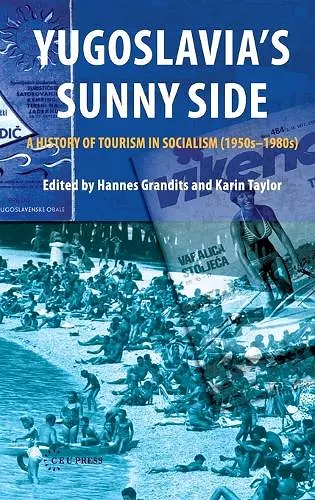Yugoslavia's Sunny Side
A History of Tourism in Socialism (1950s-1980s)
Hannes Grandits editor Karin Taylor editor
Format:Hardback
Publisher:Central European University Press
Published:15th Jul '10
Currently unavailable, and unfortunately no date known when it will be back

Despite the central role of tourism in the political making of the Yugoslav socialist state after WWII and in everyday life, the topic has remained neglected as an object of historical research, which has tended to dwell on war and ethnic conflict in the past two decades. For many former citizens of Yugoslavia, however, memories of holidaymaking, as well as tourism as a means of livelihood, today evoke a sense of the good life people enjoyed before the economy, and subsequently the country, fell apart. Ths book undertakes a critical analysis of the history of domestic tourism in Yugoslavia under Commumism. The story evolved from the popularization of tourism and holidaymaking among Yugoslav citizens in the 1950s and 1960s to the consumer practices of the 1970s and 1980s. It reviews tourism as a political, economic and social project of the Yugoslav federal state, and as a crucial field of social integration. The book investigates how socialist and Yugoslav ideologies aimed to turn workers into consumers of purposeful leisure, and how these ideas were set against actual practices of recreation and holidaymaking.
"The wars that ended Yugoslavia obscured the country's successes during its 1945-91 existence, and few now recall that from the 1960s through 1990, Yugoslavia was a major destination for tourists from Western Europe. The country also had a well-developed domestic tourist industry. Thirteen authors cover topics ranging from broad considerations of tourism and the making of socialist Yugoslavia through specific analyses of youth work brigades, the political tourist shrine created out of Tito's birthplace, cross-border shopping in Italy by Yugoslavia tourists, and an insightful analysis of the Sarajevo Olympics as both unifying spectacle for Yugoslavia's people and source of contention between the politicians of its constituent republics. The changes in Yugoslav tourism from free vacations at "workers' resorts" to market-driven transformation of small, privately owned "weekend houses" into rental cottages is also covered well. In the end, it seems that tourism contributed to the successes of Yugoslav socialism, but also to the increased perceptions of Yugoslavs in the 1980s that the country was failing to deliver on promises of the good life. A major contribution to studies of Yugoslavia, tourism, and cultural history. Summing Up: Highly recommended." * Choice *
"This work not only provides a comprehensive account of tourism under the four-and-a-half decades of communist rule in Yugoslavia, but goes further to assert its crucial role in the establishment and complex evolution of the fragile postwar federation.... Yugoslavia’s Sunny Side is strongly interdisciplinary, incorporating scholars of anthropology, ethnology, and history. Despite this diverse collection of voices, the book achieves admirable resonance and harmony. In an array of different contexts, the authors consistently demonstrate not only the importance of tourism to the country economically, but more significantly its inherent contradictions that threatened to undermine the “project” of postwar Yugoslavia.... Yugoslavia’s Sunny Side, then, is a fine example of contemporary tourism scholarship. It advances our understanding of tourism’s political and social significance, and sheds new light on the ways in which Yugoslavia’s distinctive openness to Western outsiders both sustained and threatened the always-fragile federation. It will be of significant value to readers interested not only in tourism history, but also in the historical evolution, and ultimate disintegration, of the postwar Yugoslavian vision." * East Central Europe *
"In general, Yugoslavia's Sunny Side deconstructs the monolithic imaginings of state socialism, complex ideologies, and power relations. It provides rich historical records and empirical materials for understanding the processes of proletarization; the social and cultural meanings of class; different forms of Balkanism, Orientalism, and Western cultural hegemony; economies of shortage; parallel economies; and the unstable, shifting, and fluid loyalties under Yugoslavian socialism." * Slavic and East European Journal *
"Yugoslavia’s Sunny Side is multidisciplinary in approach. At the same time, through three thematic sections, it retains a historical arch that encourages the reader to see the individual essays as speaking to larger shifts. Each authored piece, however long or short, is followed by a full list of references. On the other hand, this detailed approach does mean that the book functions as an effective resource for both research and teaching. Postwar realities largely dashed hopes for the unifying power of communism—of both the Bloc and Yugoslav variety. One of those realities was consumerism; another was nationalism, to which Yugoslavia was particularly vulnerable. The editors aim to provide a history that will counter the recent nationalism-dominated narratives, but what these essays reveal is that holiday-making, like so much else in 'sunny' Yugoslavia, was ultimately rife with contradiction." * Slavic Review *
ISBN: 9789639776692
Dimensions: unknown
Weight: 970g
438 pages